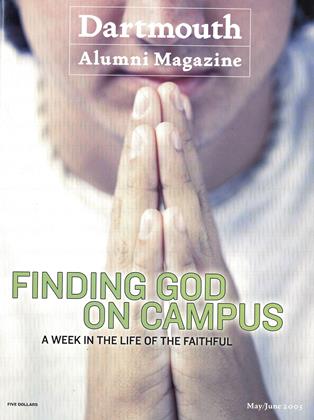GREGORY RABASSA '44 masters the art of language.
The Italian phrase "traduttore, traditore" (translator, traitor)—the idea that translation is treason—would seem to be harsh criticism for someone who has spent nearly 40 years working in translation.
Yet this is just the theme Gregory Rabassa explores in his forthcoming autobiography, If This Be Treason:Translation and its Dyscontents, to be published in April.
Dressed in Dartmouth green and wearing a Dartmouth watch, Rabassa recently recalled how he got his formal start with Spanish and Portuguese—the two languages he would later use to build his career as a translator—studying Romance languages at Dartmouth. Although his father was Cuban, Rabassa grew up speaking English at home; he says "the old man" used Spanish only for cursing and food.
After attending Hanover High, Rabassa enrolled at Dartmouth, but left the College six credits shy in 1942 because of the war, eventually receiving his diploma while overseas with the Office of Strategic Services (O.S.S.)—as he sees it, gaining three credits of physical education for infantry training and three credits for modern European history there.
Rabassa is perhaps most widely known for his 1970 English version of Gabriel Garcia Marquez's OneHundred Years of Solitude, but he has translated more than 40 works by some of the more prominent Spanish- and Portuguese-speaking authors. In 1967 Rabassa received the first National Book Club Award for Translation for his very first work, Julio Cortazar's Rayuela.
Despite this success, Rabassa at heart believes that translation is impossible. "What we think of as translation in a way is reproduction," he says. "You can't do that from one language to another."
While the translations he enjoys the most are the easier ones, "sometimes the troublesome books can be a lot of fun, which is what I'm doing now," says Rabassa. His current project is Antonio Lobo Antunes' What Can I Do When Everything'son Fire?
 View Full Issue
View Full Issue
More From This Issue
-
 Cover Story
Cover StoryFinding God at Dartmouth
May | June 2005 By CATHERINE FAUROT, MALS ’04 -
 Feature
FeatureA Life Overboard
May | June 2005 By BRYANT URSTADT ’91 -
 Feature
FeatureLost and Found
May | June 2005 By Jennifer Wulff ’96 -
 Feature
FeatureNotebook
May | June 2005 By THOMAS AMES JR. '74 -
 Feature
FeatureAlumni News
May | June 2005 By Olivia Britt '00 -
 FACULTY OPINION
FACULTY OPINIONShiny Bubble
May | June 2005 By JOHN H. VOGEL JR.








